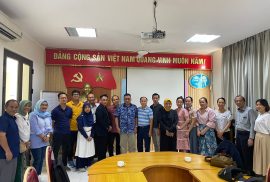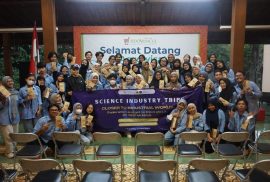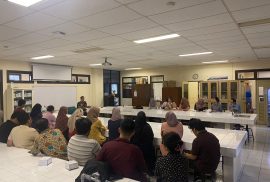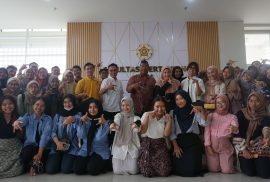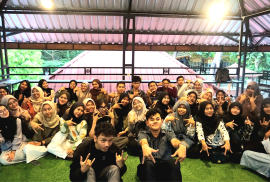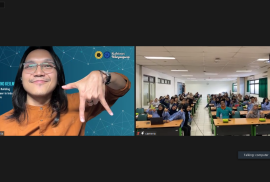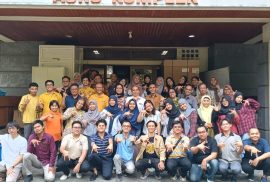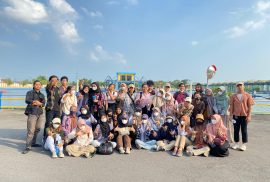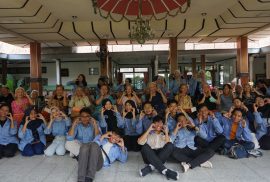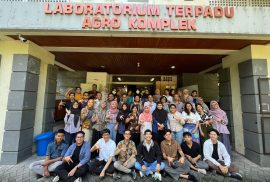The Department of Agricultural Microbiology, Faculty of Agriculture, UGM conducted a comparative study to Hanoi University of Science and Technology (HUST) and Plant Medicinal Research Centre (PMRC) in Vietnam. This activity aimed to establish cooperation with both institutions in Vietnam, promote the reputation of Gadjah Mada University as a global player in education, research, and community service, gain insights into curriculum development in the field of Agricultural Microbiology, and map potential programs that can be continued as collaborations between the university and related institutions. This comparative study was conducted from July 15-16, 2024, with activities including a visit to Hanoi University of Sciences and Technology (HUST) on Monday, July 15, 2024, with discussion topics on the potential collaboration between UGM and HUST. It continued on Tuesday, July 16, 2024, with a visit to the Plant Medicinal Research Center (PMRC) with the topic of potential collaboration between UGM and PMRC.
SDG 4: QUALITY EDUCATION
The Agricultural Microbiology Student Association (PERMAHAMI), in collaboration with the Department of Agricultural Microbiology, organized an industrial visit to PT Industri Jamu dan Farmasi Sido Muncul Tbk. located in Ungaran, Semarang, attended by 53 students and accompanied by two faculty advisors. The visit, held on Tuesday, July 2, 2024, aimed to provide knowledge and experience in understanding firsthand how the concepts studied in the classroom are applied in real-world practice.
The visit was received by the Public Relations of PT Industri Jamu dan Farmasi Sido Muncul Tbk, Mrs. Ami, and began with an explanation of the rules while at the industrial location. Ami explained that after the COVID-19 pandemic, Sido Muncul limited company visits to minimize the transmission impact. Ami further explained that Sido Muncul has a vision to become a pharmaceutical company, traditional medicine, health food and beverages, cosmetics, and herbal processing that benefits society and the environment.
The Department of Agricultural Microbiology organized a Community Service and Research Student Meeting on Wednesday, July 3, 2024. This event was held at the Integrated Agrocomplex Laboratory, Universitas Gadjah Mada, and was attended by faculty representatives, including Muhammad Saifur Rohman, S.P., M.Si., M.Eng., Ph.D., Desi Utami, S.P., M.Sc., Ph.D., Susanti Mugi Lestari, S.P., M.Si., Ph.D., and Yumechris Amekan, S.Si., M.Biotech., Ph.D., as well as educational staff, temporary daily workers (THL), and research students. The event started at 08:00 with community service at each laboratory where the researchers were based, followed by a research student meeting at 10:00 which included an evaluation of the ongoing research in the laboratory.
The Department of Agricultural Microbiology held a Seminar or Guest Lecture on Friday, June 28, 2024. The Guest Lecture aimed to introduce ISO, HACCP, and SNI. The event was held at the Venture Lab, AGLC Building, 6th Floor, Faculty of Agriculture, UGM, attended by all microbiology lecturers and 54 microbiology students from various cohorts. The event began with a warm welcome from the Head of the Department of Agricultural Microbiology, Ir. Donny Widianto, Ph.D. In his speech, Donny conveyed that Training on Standardization and Conformity Assessment (ISO, HACCP, and SNI) is essential to be recognized and studied.
Microdiscussion is a discussion activity among students facilitated by the department of agricultural microbiology. This discussion addresses various stages of coursework before reaching the thesis stage, such as fieldwork and class seminars. Microdiscussion not only covers academic-related topics but also provides tips and tricks necessary for navigating college life. It is hoped that Microdiscussion will serve as a platform for students to ask questions and gain broader insights about the college world from the experiences of various speakers, allowing microbiology students to prepare themselves for future academic challenges.
Bincang Bareng Keilmuan (BBK): Career talkshow Session is a talkshow agenda as a session to share experiences about the career world as a provision for active Microbiology students in preparing to face the world of work. Through the Scientific Talk agenda, it is hoped that it can prepare students to face challenges, where the world of work is different from the campus world and career competition will be increasingly difficult.
On Saturday, June 8, 2024 Bincang Bareng Keilmuan (BBK): Career talkshow session was held in a hybrid manner, online in the Zoom meeting room and offline in the KPTU room, A1 Building, 3rd Floor. The BBK event was attended by Susanti Mugi Lestari, S.P., M.Si., Ph.D. and Agung Dian Kharisma, S.Pd.Si., M.Biotek, Ph.D. as representatives of lecturers of the Agricultural Microbiology department and active students of Agricultural Microbiology as many as 48 participants. BBK: Career talkshow session was initiated by the Scientific Department of the Microbiology Student Association (Permahami) because it saw the difficulty of competing in the world of work after graduating from campus. So that the BBK event carries the theme “Sharing by Alumni: Building Capacity for a Career in Industry”.
The Department of Agricultural Microbiology held a Farewell Party on Friday, May 31, 2024. The event, which was held at the Agrocomplex Integrated Laboratory, Gadjah Mada University, was attended by all lecturers, education staff, casual daily workers (THL), and research students. The event began with a warm welcome from the Head of the Department of Agricultural Microbiology, Ir. Donny Widianto, Ph.D. The Farewell party was held for one of the research assistants in the Department, Qiurita Fortuna.
On May 20, 2024, the Sewon Bantul Yogyakarta PIALAM Wastewater Treatment Plant became the location for a field visit as part of an aquatic microbiology practicum. The visit was attended by 36 students and 4 practicum assistants, accompanied by the Practicum Supervisor, Nur Akbar Arofatullah, S.P., M.Biotech., Ph.D. The event began with welcoming remarks from the supervisor and representatives of the PIALAM Wastewater Treatment Plant, who warmly greeted the group. Following the welcome, a presentation was given on the Sequencing Batch Reactor (SBR) system used by the plant for domestic wastewater treatment in Yogyakarta city.
Yogyakarta-The Microbiology Student Association (PERMAHAMI) organized a social service activity on Friday, May 10, 2024 at Wreda Hanna Nursing Home, Jl. Surokarsan, Wirogunan, Kec. Mergangsan, Yogyakarta City, Yogyakarta Special Region. The Sosmas Bagi-Bagi (SBB) activity was attended by 19 students from Permahami and 31 nursing home residents and administrators.
Sosmas Bagi-Bagi (SBB) is a work program of the Permahami Community Social department which carries out social service activities to the wider community and has a positive impact on the social environment. SBB activities carry the theme “The more we have, the more we share” which has a philosophy in the form of the more we have, the more we share, so that the advantages we have are also a good opportunity to continue sharing.
The Department of Agricultural Microbiology held a Sarasehan event on Friday, April 26, 2024. The event, held at the Integrated Laboratory of the Agrocomplex, Gadjah Mada University, was attended by all lecturers, educational staff, daily workers, and research students. The event began with warm remarks from the Chair of the Department of Agricultural Microbiology, Ir. Donny Widianto, Ph.D.
In his speech, Donny conveyed that the Microbiology Department has a flagship program called Fast track, where students can obtain two degrees simultaneously in just five years, namely a bachelor’s degree in agriculture and a master’s degree in biotechnology. This Sarasehan event also served as a Farewell party for one of the research assistants in the Department, Ni Nyoman Sista Jayasanti. In addition to being a research assistant in Agricultural Microbiology, Sista also pursued her master’s degree and was recently graduated with a Master’s degree in Biotechnology on April 24, 2024, from the Graduate School of UGM.

